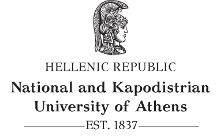NEWS
PRESS RELEASE: 4TH PANHELLENIC SCIENTIFIC SYMPOSIUM “LOGO-LIKE ENVIRONMENTS AND STEM EDUCATION IN THE ERA OF ARTIFICIAL INTELLIGENCE”
The 4th Panhellenic Scientific Symposium on “Logo-like Environments and STEM Education in the Age of Artificial Intelligence” was successfully completed, organized by the Informatics Laboratory of the Department of Primary Education (PTDE) of the National and Kapodistrian University of Athens (NKUA), on Saturday 22 and Sunday 23 February 2025, at Marasli (Marasli 4, Athens). The Symposium included eight workshops, a round table and four invited speeches by faculty members and researchers. Over 250 primary and secondary education teachers, undergraduate and postgraduate students and many researchers participated in it on both days (See moments from the Symposium: www.logotreegr.net/moments4).
The Informatics Laboratory of the Department of Computer Science of the National University of Athens, participated in the Symposium by organizing two Workshops by its partners.
In the first workshop on the topic of "Aerial Educational Robotics: Using Drones through Visual Programming in STEM Education" (Presenters: Sivenas Tryfon, Koutromanos Georgios, Larios Nikolaos & Georgiadis Georgios), the participants were introduced to the possibilities of drones as innovative tools for enhancing STEM Education. The teachers were informed about the characteristics and educational applications of drones and, through the visual programming environment DroneBlocks Builder, they designed scenarios for their integration into teaching practice. Afterwards, the participants implemented free flight missions with Ryze Tello drones, experiencing the connection between theory and practice.
In the second workshop on the topic of “Simple structures for smart solutions: Exploring automation with Mind+ and school robotics equipment” (Speaker: Vasilis Economou, Workshop Associate) the emphasis was placed on robotics and automation technology and how to utilize it in the modern educational process. Teachers had the opportunity to learn about ways to utilize available school robotics equipment, through a single visualized programming environment. Practical examples of creating innovative automations were presented, as well as activities that combine STEM Education with real applications of the Internet of Things (IoT).
In general, both these workshops and the others were of great interest to primary and secondary education teachers, as well as to students of pedagogical departments, offering them useful tools for integrating digital technology into their teaching practices. With an emphasis on connecting theory and practice, participants gained knowledge and ideas that they can immediately apply in the classroom, enhancing students' creativity and critical thinking.
The Informatics Laboratory warmly thanks all members of the Organizing Committee as well as the Local Organizing Committee who contributed to the successful conduct of the Symposium, and especially all the speakers, participating teachers, students and researchers.
